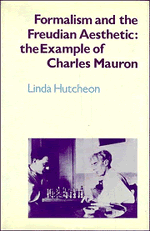Book contents
- Frontmatter
- Contents
- Preface
- Acknowledgments
- Introduction
- Part I The critical formation: science, formalism, and aesthetic contemplation
- Part II Psychoanalysis and literary criticism
- 5 Scientific psychology and art
- 6 Psychoanalysis and psychocritique
- 7 Psychocritique: formalism, science, and the value of problems
- 8 Psychocritique and the modern French critical context
- Conclusion
- Appendices
- Notes
- Index
6 - Psychoanalysis and psychocritique
Published online by Cambridge University Press: 12 January 2010
- Frontmatter
- Contents
- Preface
- Acknowledgments
- Introduction
- Part I The critical formation: science, formalism, and aesthetic contemplation
- Part II Psychoanalysis and literary criticism
- 5 Scientific psychology and art
- 6 Psychoanalysis and psychocritique
- 7 Psychocritique: formalism, science, and the value of problems
- 8 Psychocritique and the modern French critical context
- Conclusion
- Appendices
- Notes
- Index
Summary
Entre la critique dont Sainte-Beuve usa pour Racine et celle que Marie Bonaparte ou le DR Laforgue appliquent à Poe ou à Baudelaire, il y a place pour de nombreuses formules.
charles mauronMAURON'S PARTICULAR ATTRACTION to Freud's theories grew out of his personal need to find a critical orthodoxy that would serve to unite science and art, to objectivize the subjective. As an aesthetician, he saw in Freud's work what he felt to be a scientific theory of the sources of aesthetic experience; as a literary critic, he thought Freud offered experimental techniques by which to approach the artwork in an objective manner. He was not particularly interested in Freud as an interpreter of culture. As Mauron moved away from the mystics, or rather, as he “digested” his Eastern reading and formulated his theory of the triple psyche, the word “spiritual” began, as we saw in Chapter 4, to take on the meaning of “psychological.” His objections to Freud at that time centered on Freud's binary thinking (for instance, the pleasure and reality principles) and on his formulation of the unconscious in what Mauron felt to be only debasing sexual terms. I suspect Mauron did not fully understand the concept of the Freudian unconscious at this time; therefore he felt the need to posit, in L'Homme triple, that higher superior form of the unconscious to account for the things he valued most: art, science, all the products of intellectual effort (1947: 71–3, 149–55, 197).
- Type
- Chapter
- Information
- Formalism and the Freudian AestheticThe Example of Charles Mauron, pp. 115 - 133Publisher: Cambridge University PressPrint publication year: 1984



